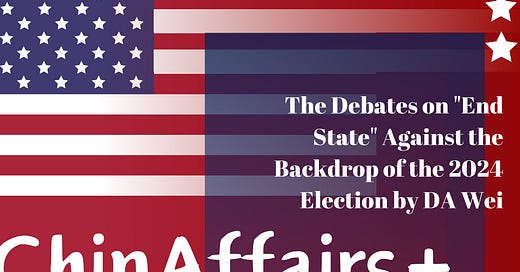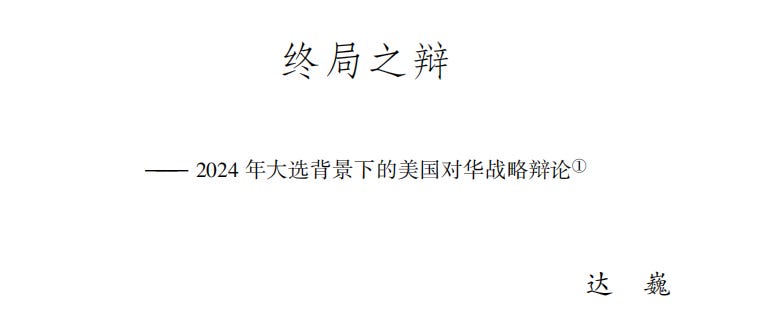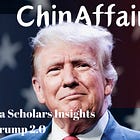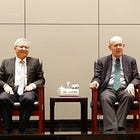DA Wei on the U.S. Debates on “End State” of its China Policy
Strategic dialogues and clashes within and between China and the U.S. will persist until a new equilibrium in their relations take shape.
Welcome to the 18th edition of our weekly newsletter! ChinAffairs+ is a weekly newsletter that shares Chinese academic articles focused on topics such as China’s foreign policy, China-U.S. relations, China-European relations, and more. This newsletter was co-founded by me and my research assistant, ZHANG Xueyu. I am SUN Chenghao, a fellow with the Center for International Security and Strategy (CISS) at Tsinghua University, Council Member of The Chinese Association of American Studies and a visiting scholar at the Paul Tsai China Center of Yale Law School (fall semester 2024).
Through carefully selected Chinese academic articles, we aim to provide you with key insights into the issues that China’s academic and strategic communities are focused on. We will highlight why each article matters and the most important takeaways. Questions or criticisms may be addressed to sunchenghao@tsinghua.edu.cn
Today, we have selected an article written by Da Wei, which focuses on the U.S. debate of “end state” of its China policy against the backdrop of the 2024 U.S. election.
Summary
The focus of this study is the new round of debate in the U.S. strategic community regarding the “end state” of China strategy during the 2024 U.S. presidential election. The main viewpoints in the debate are “regime-based end state”, “order-based end state”, “policy-based end state” and “no-end-state”. The debate shows that the U.S. strategic understanding of China tends to be more negative. It is currently difficult to predict which of the above views will become a strategic choice for the Trump administration after taking office, but the consensus in the U.S. strategic community on the “end state” is far from formed.
Why it matters
The academic contribution of the article lies in its multidimensional perspective, which enhances understanding of the complexity of China-U.S. relations and promotes deeper discussions on their future trajectory. By documenting current debates, it provides crucial insights into the logic of U.S. foreign policy, particularly regarding great power competition.
For future research, the article suggests that studies of China-U.S. relations should move beyond simple policy analysis and examine strategic intentions, international order, and domestic political shifts. It stresses the importance of understanding how internal changes in both countries influence bilateral relations and calls for rethinking the boundaries of competition and cooperation. Furthermore, it encourages scholars to explore potential cooperation between the U.S. and China on global issues and seek new paths for coexistence amid competition.
Since this round of debate has only recently emerged, China's academic community is largely still observing the direction of the discussion. However, most Chinese scholars believe that this round of debate in the U.S. has not moved beyond the broader framework of strategic competition with China. Compared to the debates on China in 2014 and 2015, the outcome of this current debate is not considered as significant, and it may also be an attempt to shape policy before the new administration takes office.
Key Points
The Debates on the Four Viewpoints of “End State”
The “end state” describes the ultimate goal of China-U.S. competition. While a bipartisan consensus since 2017 frames this relationship as “strategic competition”, Biden’s emphasis on a stable state sparked criticism, igniting debates on four views: regime-based, order-based, policy-based end states, or rejecting the need for an end state.
The “Regime-Based” End State Theory
This type of viewpoint is the one that sparked this round of debate, and it is also the most hardline viewpoint towards China, having the strongest relationship with the Republican Party. The basis of this viewpoint is the profound hostility of the proponents towards the Chinese political system. According to the degree, it can be divided into two categories.
The first one is “regime change” represented by Matt Pottinger and Mike Gallagher. Its ultimate goal is to fundamentally change China’s political system and the leadership of the Communist Party of China, leading to a “collapse of China”.
The second one is “waiting for failure” whose main idea is that the U.S. should wait for China to become “weakened” or “collapse” due to its own problems or internal pressures.
Both arguments mentioned above essentially advocate for fundamentally changing China’s political system and are criticized by many scholars who believed that China’s economic, technological, and military strength is too significant, and any proposal that threatens China’s political security will be perceived by China as an existential threat. This would lead to China adopting policies of fierce confrontation with the U.S., resulting in a severe crisis in China-U.S. relations.
The “Order-Based” End State Theory
This round of debate emphasizes the “end state” should focus on international order rather than on China or the competition with China.
Ryan Hass emphasizes that the U.S. should engage with China based on national interest principles and seek cooperation on global challenges. Elizabeth Economy argues that the U.S. strategy toward China should aim to align China with a broader liberal vision for the world. Scott Kennedy similarly highlights the importance of a larger global order and contends that Washington should shift from “de-risking” to “rebuilding”. Evan S. Medeiros suggests that the U.S. strategy toward China should maintain flexibility and ambiguity to allow for adjustments based on the evolving nature of competition while expanding the steady-state competition toolbox with China. Matt Turpin shares a similar perspective but stresses the need for a tougher policy toward both China and Russia.
The “Policy-Based” End State Theory
Rick Waters argues that an “end state” should be based on specific policies. He contends that U.S. policy toward China should focus on addressing and narrowing the policy differences between the two countries. Besides, Susan Shirk criticizes the concepts including “strategic competition” and “managed competition” as overly vague. However, she does not propose a definitive end state but instead suggests that the two countries should engage in close communication and reach agreements on specific issues, achieving their objectives through diplomatic approaches.
The “No-End-State” Theory
Rush Doshi argues that the U.S. should not set a definitive end state in its strategy toward China, and he defends the China policy of Biden administration. Kurt Campbell also explicitly states that the focus should shift from pursuing an end state to seeking a steady state. Hal Brands refers to the idea of not setting an end state and managing competition as “competitive coexistence”, where the U.S. should continuously demonstrate its advantages to China, allowing China to gradually decide to mellow its foreign policy.
Scholars less closely associated with the Biden administration provide different arguments. Albridge Colby believes that the U.S. should accept the reality that competition and hostility between the U.S. and China are difficult to escape, reflecting a realist perspective that seeks to achieve U.S. strategic goals through power balancing. In addition, Sun Yun suggests that maintaining ambiguity may better align with U.S. interests. A one-dimensional, irreversible, and strictly defined U.S. strategy toward China could lead to underestimating China’s power and resilience, overestimating the threat posed by China, and missing opportunities for cooperation with China on global issues.
New Debates and Motivations
Although arguments shown in early debates seem different, they indeed share similarities and indicate strategic competition with China appears to have become a bipartisan and cross-sector consensus within the United States.
Characteristics of Previous Debates: Interconnectedness
Firstly, proponents of the “regime-based”, “order-based”, and “policy-based” perspectives all agree that the U.S. needs a final, conclusive discourse on its strategy toward China, and they share criticisms of the Biden administration’s approach.
Secondly, advocates of the “order-based”, “policy-based”, or “no-end-state” perspectives generally present more flexible and ambiguous views on the issue of an end state, while “regime-based” advocates emphasize a clearer, more adversarial finality.
Thirdly, both “regime-based” and “order-based” perspectives agree that the U.S. should encourage changes in China based on specific values and international order. The “no-end-state” perspective reflects a more realist mindset, while the complex co-existence held by Rush Doshi suggests a limited compromise.
Finally, although Rush Doshi strongly opposes the “regime-based” end-state theory, he shares the view that China intends and is capable of surpassing the United States in both technology and the international order.
Motivations for the New Debate
Firstly, scholars have a debate on China’s Strategic Intentions:
Most scholars acknowledge China’s negative strategic intentions towards the United States. Boming and Gallagher offer the most pessimistic assessments of China’s intentions, asserting that China seeks to overturn the existing international order. Although Jessica Chen Weiss and James Stenberg oppose the views of Boming and Gallagher, they still express considerable criticism of China’s strategic objectives.
Paul Heer believes that China’s adjustments of foreign policy are reactions to the external shifts. He contends that China does not seek to create global chaos, but rather hopes to establish a favorable external environment. China wants to engage in constructive relations with the U.S., aiming for peaceful coexistence. Although Heer’s perspective aligns more closely with China's self-perception of its intentions, it remains a minority opinion within the current U.S. strategic discourse.
Secondly, scholars have a debate on the similarities and differences of China and the Soviet Union:
Advocates of the “regime-based” argument often highlight China’s parallels with the Soviet Union. Drawing on the “Soviet analogy”, Boming and others contend that a tougher U.S. stance on China increases the likelihood of China appearing weak, ultimately resulting in coexistence under terms more favorable to the United States.
However, this viewpoint has been met with significant criticism. Many scholars hold that China is not the Soviet Union, which was a widely accepted view even 20 years ago. The revival of the argument on the similarities between China and the USSR underscores a major shift in U.S. preception of China’s strategy.
Aside from the differences in domestic political systems between China and the US, the strategic competition framework initiated by Trump and the disruption of interpersonal exchanges caused by the COVID-19 pandemic are also key reasons for these changes.
New Debates and the Future of China-U.S. Relations
Donald Trump’s overwhelming victory in 2024 introduces uncertainties to China-U.S. relations. Current debates are unlikely to shape Trump's China policy, leaving the strategy’s trajectory unpredictable.
Proponents of the “regime-based” theory are absent from the administration, while “order-based” advocates remain marginalized. Limited China-U.S. communication may shrink further, complicating “policy-based” approaches, while the Biden-era “no-end-state” policy is expected to be discarded. Across perspectives, U.S. strategic circles exhibit arrogance, assuming China’s failure or transformation. So China-U.S. relations are poised for a new phase of change. In this sense, the reasons for this change should be further explored.
Structural Causes
The deterioration of China-U.S. relations is fundamentally driven by structural changes rather than any specific policy. In the post-Cold War international order, both China and the U.S. were among the greatest beneficiaries of globalization. However, increasingly pressing global challenges have prompted nations worldwide to adjust their development strategies, forming the structural basis for changes in China-U.S. relations.
After eight years, especially with Trump’s re-election in 2024, the influence of public opinion rejecting the previous era and order has become more evident. In this context, the “order-based” end-state theory seems unattainable, as neither China nor the U.S. can return to their original positions. Meanwhile, the “regime-based” end-state theory mistakenly applies Cold War-era thinking to today’s international political reality between China and the U.S.
Identity Confusion between China and the U.S.
Behind the debates over the nature of China-U.S. relations lies a more fundamental issue: both nations’ confusion and uncertainty about their own identities. Who is the United States? What are the key characteristics that enable the United States to lead the world for an extended period? Who is China? Why has China been so successful over the past 40 years? This has infused excessive emotion and misconceptions into their bilateral relationship, leading to an exaggerated sense of strategic competition or confrontation.
In the U.S. and the broader Western world, the international order is often taken for granted as a competitive target for both countries. When China expresses its commitment to maintaining “an international system centered around the United Nations and an international order based on international law”, many emphasis its divergence with the U.S.’s international order. Years of confrontations over various issues have even caused a divergence in the terminology used by China and the U.S.
Conclusion
A complex internal debate exists within the U.S., shaping its developmental trajectory as well as its domestic and foreign policies. Whether viewed through the lens of the current China-U.S. strategic discourse or Trump’s policy considerations, it is clear that the two nations remain far from achieving a mutually acceptable resolution. In the years ahead, strategic exchanges and confrontations between the two countries will persist. To establish a relationship of coexistence, frequent government dialogues, civil exchanges, and academic cooperation are essential to redefining their competitive relationship and making adjustments in both perception and action.
Firstly, it is important to accept that China-U.S. relations are likely to remain relatively tense for a considerable period. Secondly, despite significant differences, both nations share similar views on many issues, making it critical to clarify and narrow the scope of competition, allowing room for both cooperation and rivalry. Thirdly, while competition in areas like economics, technology, and military affairs is inevitable, it should be based on self-strengthening rather than efforts to weaken the other. Such competition must adhere to mutually accepted rules rather than relying on coercion. Finally, neither side can “win” by completely dismantling the other. Both nations must provide strategic assurances and avoid pushing each other into inescapable situations.
About the Author
Da Wei(达巍): He is the director of the Center for International Security and Strategy (CISS), and professor of department of International Relations, school of Social Science, Tsinghua University. Dr. Da’s research expertise covers China-US relations and US security & foreign policy. Da Wei has worked in China’s academic and policy community for more than two decades. Prior to current positions, Dr. Da Wei was the assistant president of University of International Relations (2017-2020), director of the Institute of American Studies, China Institutes of Contemporary International Relations (2013-2017).
About the Publication
The Chinese version of the article is published in The Chinese Journal of American Studies(《美国研究》). It was founded in 1987 and is an academic bimonthly publication sponsored by the Institute of American Studies at the Chinese Academy of Social Sciences and the Chinese American Society. Publish articles by Chinese scholars studying various aspects of American society, including American politics, economy, diplomacy, military, technology, culture, history, art, and thought. It is a common ground for all Chinese scholars engaged in studying American issues, and a center for exchanging knowledge and understanding of the United States.












The US scholars seem to be only talking to themselves? They should be talking with (and not at) Chinese scholars. Just my view.
"Although Heer’s perspective aligns more closely with China's self-perception of its intentions..."
which China is he referring to? In truth, only one man knows. everyone else is second- and third-guessing